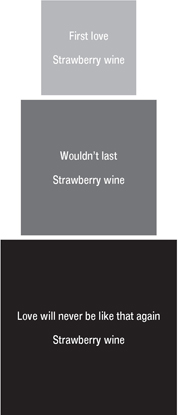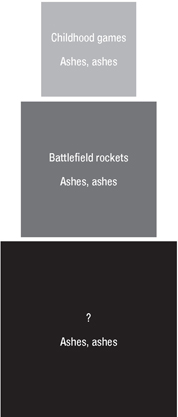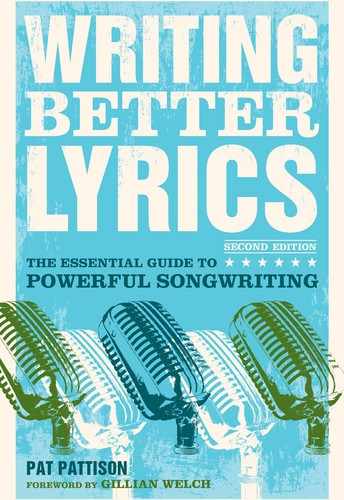CHAPTER SIX
PRODUCTIVE REPETITION
In its simplest form, this is the basic rule of songwriting: Keep your listeners interested all the way through your song. Get them with you from the beginning with a strong opening line, then keep them with you the rest of the way. Whether they stay or go is up to you.
In most songs, you'll repeat a line (refrain) or a section (chorus) two or three times. The danger is that once your listeners have heard something once, it will be less interesting the second and third time — like once, it will be less interesting the second and telling the same person the same joke three times in a row: Once you've heard it, it doesn't give you anything more the second or third time.
Your job as a songwriter is to make your repetition interesting and productive so that the same words deliver more each time. A bit of a challenge, eh?
It might be helpful to think about a song as a stack of boxes that are connected to each other, each one getting progressively larger. Think of each one gaining more weight, the last being the heaviest of the lot.
The first box begins the flow of ideas, introducing us to the song's world. The second box continues the idea, but from a different angle, combining the weight of the first box with the weight of the second. The last box builds from the first two, introducing its own angle and combining its idea with the first two, resulting in the heaviest box.

Assume you're working with the idea “I'd just like to know.”
Box 1: “Hi, it's nice to see you. You're looking good, and you're looking really happy. Are you? I hope you don't mind my asking. I'd just like to know.”'Sup I'd just like to know

Let's try to advance the idea and make the second box gain weight.
Box 2: “When you left, did you already know you were moving in with him? When I was out of town, did he come over to your place? Did you hide that picture of us you kept on your dresser? I suppose it doesn't matter now, but I'd just like to know.” D'ja cheat? I'd just like to know

See how the idea gains weight with the new information? It combines the first box, the meeting, with some history, giving the second box more weight and giving more impact to the title.
Box 3: “For me, a relationship is all about honesty. I want to be able to say everything to you, and for you to say everything to me. I don't want any secrets, no matter what. You could have told me about him. I wouldn't have tried to stop you. I'd just like to know.”

Box 3 combines or resolves all the information, and delivers the point of the song. It's often the “why” of the song — why I'm saying all this to you. It weighs the most.
Now, it's simply a matter of actually writing the song, but writing it knowing where you're going. You have an outline, a scaffold to hang your song on. You can bang around inside each box without being afraid of getting lost.
And don't be afraid to call your six best friends — who, what, where, when, why, and how — to ask them for specific suggestions. They're always helpful, especially when and where.
VERSE DEVELOPMENT
Your verses are responsible for keeping listeners interested. The verses develop your idea; they are the basic tool to advance your concept, plot, or story. They get us ready to hear each chorus or refrain — they control the angle of entry and the way we see the repeated elements. Like the paragraphs of an essay, each one should focus on a separate idea.
Say you've written a song with only verses, and the verse summaries go something like:
Verse 1. The sheriff is the toughest man in town.
Verse 2. He is very strong and has a fast gun.
Verse 3. Everyone in town knows the sheriff is tough. They are afraid of him.
The ideas don't move much. These verses say pretty much the same thing in different words. Obviously, you'd probably have written it in more interesting language, using sense-bound images and metaphors, but no matter how you polished the language, it would only disguise the fact that something important is missing: development.
The only real fix is to take the idea new places:
Verse 1. The sheriff is the toughest man in town.
Verse 2. He is obsessed with a beautiful woman.
Verse 3. She is married to the weakest man in town.
The language is still bland and imageless. Yet now we want to know what happens next. We had no such curiosity about the first sequence.
REPETITION
When you add a repeated element to these verses (a refrain or chorus), development becomes even more important. Stagnant verses will make your repeated element stagnant, too. The boxes won't grow. Watch:
Box 1
The sheriff is the toughest man in town.
Beware, beware. All hands beware.
Box 2
He is very strong and has a fast gun.
Beware, beware. All hands beware.
Box 3
Everyone in town knows the sheriff is tough.
They are afraid of him.
Beware, beware. All hands beware.
The refrain suffers from the same disease as the verses: stagnation. Boredom is amplified. The boxes, at best, are all the same size — they don't gain any weight. More likely, the boxes lose weight. You can feel the letdown when you get to the second and third boxes. You can only fix stagnation by developing the ideas. Like this:
Box 1
The sheriff is the toughest man in town.
Beware, beware. All hands beware.
Box 2
He is obsessed with a beautiful woman.
Beware, beware. All hands beware.
Box 3
She is married to the weakest man in town.
Beware, beware. All hands beware.
Now each refrain gains weight. The boxes get progressively larger because the verse ideas move forward — they each introduce their own idea or angle. When a refrain (or chorus) attaches to verses that mean the same thing, the result is boredom. When it attaches to verses that develop the idea, it gains weight and impact. It dances.
What about changing the chorus each time? Some songs do exactly that, but the definition of a chorus is “many people singing together.” If you change the words each time, you'll be the only one able to sing it the second and third time. One person singing alone is called a soloist, not a chorus. If you change the words to a refrain each time, it isn't a refrain, just additional material.
Remember, you fix a stagnant chorus or refrain by doing the same thing you do if you have only verses — you develop the idea.
Don't waste your verses. Don't let them sit idle waiting for the hook to come around and rescue them. Too often, there won't be anyone around to witness the rescue.
PUT SEPARATE IDEAS IN SEPARATE BOXES
Look at this lyric, “Strawberry Wine” by Matraca Berg and Gary Harrison:
He was working through college on my grandpa's farm
I was thirsting for knowledge and he had a car
I was caught somewhere between a woman and a child
One restless summer we found love growing wild
On the banks of the river on a well beaten path
It's funny how those memories they last
Like strawberry wine and seventeen
The hot July moon saw everything
My first taste of love oh bittersweet
Green on the vine
Like strawberry wine
I still remember when thirty was old
And my biggest fear was September when he had to go
A few cards and letters and one long distance call
We drifted away like the leaves in the fall
But year after year I come back to this place
Just to remember the taste
Of strawberry wine and seventeen
The hot July moon saw everything
My first taste of love oh bittersweet
Green on the vine
Like strawberry wine
The fields have grown over now
Years since they've seen a plow
There's nothing time hasn't touched
Is it really him or the loss of my innocence
I've been missing so much
Strawberry wine and seventeen
The hot July moon saw everything
My first taste of love oh bittersweet
Green on the vine
Like strawberry wine
What a nice lyric. The specific images really take you there, involve your own sense memories, involve you in the song. And I love the bridge, using the grandpa's fields as a metaphor for life and experience. And the chorus, from the title right on through until the end, grows each time we hear it.
Who drinks strawberry wine? Kids. Strawberry wine has both the taste of soda pop (childhood) and the danger of alcohol (adulthood). Besides which, it's cheap. It's the perfect vehicle for a song about coming of age, moving from childhood to adulthood.
Watch the boxes develop:

Each new verse idea builds on the last and adds weight to the song, enlarging the boxes. Each line gains weight each time we see it. The last chorus is the most powerful.
If we simply look at the line the hot July moon saw everything, we'll see the weight gain clearly:
Box 1: The hot July moon saw us down by the river having our first experience.
Box 2: The hot July moon knew that our love, like so many before (“well-beaten path”), wouldn't last.
Box 3: The hot July moon knew that, over time, we'd become unable to experience the innocence and power of first love — accumulated experiences would create too much awareness — “the fields have grown over now.”
The moon grows from an observer to a prophet and predictor of the future. It becomes a bigger and bigger moon, needing bigger and bigger boxes. When you write a chorus, each line you include has the same responsibility: to be able to gain weight.
Now look at this lyric, “Between Fathers and Sons” from John Jarvis and Gary Nicholson:
My father had so much to tell me
Things he said I had to know
Don't make my mistakes
There are rules you can't break
But I had to find out on my own
Now when I look at my own son
I know what my father went through
There's only so much you can do
You're proud when they walk
Scared when they run
That's how it always has been between fathers and sons
It's a bridge you can't cross
It's a cross you can't bear
It's the words you can't say
The things you can't change
No matter how much you care
So you do all you can
Then you've gotta let go
You're just part of the flow
Of the river that runs between fathers and sons
Your mother will try to protect you
Hold you as long as she can
But the higher you climb
The more you can see
That's something that I understand
One day you'll look at your own son
There'll be so much that you want to say
But he'll have to find his own way
On the road he must take
The course he must run
That's how it always has been between fathers and sons
It's a bridge you can't cross
It's a cross you can't bear
It's the words you can't say
The things you can't change
No matter how much you care
So you do all you can
Then you've gotta let go
You're just part of the flow
Of the river that runs between fathers and sons
Another nice lyric. For me, it really hits home, especially in the first chorus. It touches both the son and the father in me.
“Between Fathers and Sons” is made up of two boxes. Verses one and two plus the first chorus make up box one. Verses three and four plus the second chorus make the second box. Let's look at the first box:
My father had so much to tell me
Things he said I ought to know
Don't make my mistakes
There are rules you can't break
But I had to find out on my own
The speaker looks back at his father's attempts to help smooth the way ahead, and his own unwillingness to listen. Stubborn kid. Had to do it for himself when all that help was available.
Now when I look at my own son
I know what my father went through
There's only so much you can do
You're proud when they walk
Scared when they run
That's how it always has been between fathers and sons
Now the speaker is the father, going through the same things with his own son. He understands what he did to his father, but understands that it was necessary, perhaps even inevitable.
That's how it always has been between fathers and sons
I love the structure of the verse — how it tosses in an extra line (line three), refuses to rhyme lines four and five, then extends the last line to focus our attention on the title. Lovely moves. Now the chorus:
It's a bridge you can't cross
It's a cross you can't bear
It's the words you can't say
The things you can't change
No matter how much you care
So you do all you can
Then you've gotta let go
You're just part of the flow
Of the river that runs between fathers and sons
So far, very effective stuff. I've been interested the whole time. What a nifty chorus. I love the play on cross:
It's a bridge you can't cross
It's a cross you can't bear
and I love the metaphor
You're just part of the flow
Of the river that runs between fathers and sons
The river is a divider of generations, but it's also the connector of generations. Between means “separation,” but it also means “from one to the other.” The pattern repeats from father to son to father to son to father. Neat word play. Both the message and the fancy dancing sweep me along. Now look at the second box:
Your mother will try to protect you
Hold you as long as she can
But the higher you climb
The more you can see
That's something that I understand
This sounds familiar. Not that I've seen things from the mother's perspective yet, but I have seen the father — in fact, both fathers — trying to protect the child. I've also seen the child trying to go beyond the parents. Not that this information isn't interesting, it's just not new. The ideas (if not the exact perspectives — she and you) have been covered. This doesn't bode well for the second chorus. We'll need development rather than restatement to keep repetition interesting.
One day you'll look at your own son
There'll be so much that you want to say
But he'll have to find his own way
On the road he must take
The course he must run
That's how it always has been between fathers and sons
Oops. I know I've been here before. It's verse two with I changed to you. No need to try to universalize verse four with you. The idea was already universal. The second chorus is a goner. It can't help but say exactly the same thing as the first chorus.
It's a bridge you can't cross
It's a cross you can't bear
It's the words you can't say
The things you can't change
No matter how much you care
So you do all you can
Then you've gotta let go
You're just part of the flow
Of the river that runs between fathers and sons
It isn't so much that there is no advancement of the idea in verses three and four, there just isn't enough to give us a new look at the chorus when we get there. The power of this lovely chorus is diminished rather than enlarged the second time around, and we leave the song less interested than we were in the middle. Both boxes are the same size. Let's see if we can make the second box grow.
The song contains two perspectives: a son looking at his father, and the son as father. If the first box could focus only on the son looking at his father, saying:
My father had so much to tell me
Things he said I ought to know
Don't make my mistakes
There are rules you can't break
But I had to find out on my own
Verse two idea (in prose):
I kept him at arm's length.
I didn't want him interfering with my life.
He kept trying, but I wouldn't let him.
That's how it always has been between fathers and sons
Now move into the chorus:
It's a bridge you can't cross
It's a cross you can't bear
It's the words you can't say
The things you can't change
No matter how much you care
So you do all you can
Then you've gotta let go
You're just part of the flow
Of the river that runs between fathers and sons
We see the first chorus from the son's point of view, colored only by the son's eyes. Now the second box is free to look from the other side of the river:
Now when I look at my own son
I know what my father went through
There's only so much you can do
You're proud when they walk
Scared when they run
That's how it always has been between fathers and sons
It's a bridge you can't cross
It's a cross you can't bear
It's the words you can't say
The things you can't change
No matter how much you care
So you do all you can
Then you've gotta let go
You're just part of the flow
Of the river that runs between fathers and sons
The father's perspective colors the second chorus. It becomes — for me, at least — more interesting than the first chorus. Here is a simple principle for division of labor: Put separate ideas in separate boxes.
The problem in “Between Fathers and Sons” is that both ideas are in the first box, leaving the lyric no place new to go. Separating the ideas into separate boxes makes both choruses fresh.
DEVELOPMENT TIPS
The principle of division of labor has practical applications for your song. Say you've written a verse whose summary is:
You are really wonderful
And I've been looking for someone just like you
We should be together
Love Love Love
Love Love Love
It's difficult to see where to go next. It feels like everything's been covered. Perhaps it might help to separate the perspectives, dividing the idea into the three different perspectives: (1) you, (2) I (me), and (3) we.
Box 1: You are amazing. And beautiful. Your blonde hair flows over your milky-white complexion like chicken gravy over mashed potatoes…
Love Love Love
Love Love Love
Box 2: I've been looking for a codependent relationship for a long time. Someone who'll mother me and let me do whatever I want to…
Love Love Love
Love Love Love
Box 3: We'll always be together. Everyone I've ever loved is still with me…in the downstairs freezer…
Love Love Love
Love Love Love
Okay, just kidding. But you can see how the boxes gain weight by separating the perspectives. Call it the “you-I-we” formula for lyric development: Each verse focuses from a different perspective. It's a nice guideline for dividing your verses' jobs.
Or this — you write a verse that says:
We were so good together
But now everything's falling apart
What's going to happen to us?
Love Love Love
Love Love Love
This idea contains three tenses: past, present, and future. Try separating them into separate boxes:
Box 1: We used to smile and laugh together, etc., so much in…
Love Love Love
Love Love Love
Box 2: Everything's turned sour. What happened to…
Love Love Love
Love Love Love
Box 3: Can we work to stay together, or drift away, only remembering how it felt to be in…
Love Love Love
Love Love Love
So tense can also provide access to verse development, just like perspective can. Sometimes one or the other will be just what you need; other times, like any formula, they could take the freshness out of your writing. Be aware of these techniques, just beware of letting them become a habit in your writing.
One more tip: Just because you wrote a verse first doesn't mean it's your first verse. Give yourself two chances. Don't just ask “Where do I go next?” Try asking “What happened before this?”
Thinking about boxes from the outset, the minute an idea comes, is by far the best remedy for “second-verse hell” (songwriters' term for “Where do I go next?”).
It's better when you find an idea that contains the DNA of its own development, or when plot does the development work. Look at this lyric, “One More Dollar” from Gillian Welch:
A long time ago I left my home
For a job in the fruit trees
But I missed those hills with the windy pines
For their song seemed to suit me
So I sent my wages to my home
Said we'd soon be together
For the next good crop would pay my way
And I would come home forever
One more dime to show for my day
One more dollar and I'm on my way
When I reach those hills, boys
I'll never roam
One more dollar and I'm going home
No work said the boss at the bunk house door
There's a freeze on the branches
So when the dice came out at the bar downtown
I rolled and I took my chances
One more dime to show for my day
One more dollar and I'm on my way
When I reach those hills, boys
I'll never roam
One more dollar and I'm going home
A long time ago I left my home
Just a boy passing twenty
Could you spare a coin and a Christian prayer
For my luck has turned against me
One more dime to show for my day
One more dollar and I'm on my way
When I reach those hills, boys
I'll never roam
One more dollar and I'm going home
Wonderful stuff. See how the lyric pulls us in with its sense-bound imagery, turning us into participants rather than observers? Her words are full of our stuff. And look at the lyrics using the box structure. Watch how the chorus gains weight, transforming the meaning of the chorus each time:

Each verse moves the story forward, making chances of getting home more and more remote. Great stuff!
Let's take a look at one last example, this one with a challenge in it. In this lyric, “Unanswered Prayers” written by Pat Alger, Garth Brooks, and Larry B. Bastian, the first two verses work to set up a clear situation:
Just the other night at a hometown football game
My wife and I ran into my old high school flame
And as I introduced them the past came back to me
And I couldn't help but think of the way things used to be
She was the one that I'd wanted for all times
And each night I'd spend prayin' that God would make her mine
And if he'd only grant me that wish I'd wished back then
I'd never ask for anything again
Now comes the punch line:
Sometimes I thank God for unanswered prayers
Remember when you're talkin' to the man upstairs
That just because he doesn't answer doesn't mean he don't care
Some of God's greatest gifts are unanswered prayers
With all the information we have so far, it's a little difficult to see how to develop the story much further. Here's verse three:
She wasn't quite the angel that I remembered in my dreams
And I could tell that time had changed me in her eyes too it seemed
We tried to talk about the old days, there wasn't much we
could recall
I guess the Lord knows what he's doin' after all
Now follow it with the chorus:
Sometimes I thank God for unanswered prayers
Remember when you're talkin' to the man upstairs
That just because he doesn't answer doesn't mean he don't care
Some of God's greatest gifts are unanswered prayers
Is there anything gained? Not much. The boxes are roughly the same size. We already knew, from the combination of the first two verses and the chorus, how thankful he was not to be with his old girlfriend. This verse just elaborates on the same theme, giving us a few more details, including the old girlfriend's attitude. And the final line, I guess the Lord knows what he's doin' after all, just repeats the idea just because he doesn't answer doesn't mean he don't care.
In short, the second chorus is destined to die an ignominious death right there in front of everybody. Now the song moves into a bridge, followed by a third chorus:
And as she walked away I looked at my wife
And then and there I thanked the good Lord for the gifts in my life
Sometimes I thank God for unanswered prayers
Remember when you're talkin' to the man upstairs
That just because he doesn't answer doesn't mean he don't care
Some of God's greatest gifts are unanswered prayers
Much better. I had forgotten about the wife. The third chorus is interesting again; it gains weight by adding the wife. Go back and read the bridge followed by the whole chorus.
The wife becomes God's greatest gift. A lovely payoff.
Two out of three choruses work great, but the song sags at the second chorus. There isn't enough new information in verse three to make the chorus interesting. Other than leaving it alone as good enough (two out of three ain't bad …), what would you do?
One possibility might be to reintroduce the wife in verse three and skip the bridge entirely, like this:
She wasn't quite the angel that I remembered in my dreams
And I could tell that time had changed me in her eyes too it seemed
As she turned and walked away I looked at my wife
And recognized the gift I'd been given in my life
Sometimes I thank God for unanswered prayers
Remember when you're talkin' to the man upstairs
That just because he doesn't answer doesn't mean he don't care
Some of God's greatest gifts are unanswered prayers
Now the song is a simple three verse, two chorus layout with both choruses doing their work. Read the entire lyric and watch how each chorus changes:
Just the other night at a hometown football game
My wife and I ran into my old high school flame
And as I introduced them the past came back to me
And I couldn't help but think of the way things used to be
She was the one that I'd wanted for all times
And each night I'd spend prayin' that God would make her mine
And if he'd only grant me that wish I'd wished back then
I'd never ask for anything again
Sometimes I thank God for unanswered prayers
Remember when you're talkin' to the man upstairs
That just because he doesn't answer doesn't mean he don't care
Some of God's greatest gifts are unanswered prayers
She wasn't quite the angel that I remembered in my dreams
And I could tell that time had changed me in her eyes too it seemed
As she turned and walked away I looked at my wife
And recognized the gift I'd been given in my life
Sometimes I thank God for unanswered prayers
Remember when you're talkin' to the man upstairs
That just because he doesn't answer doesn't mean he don't care
Some of God's greatest gifts are unanswered prayers
Very effective movement.
Okay, you caught me. I lied. The original version of the lyric that I gave you isn't the way the song was recorded. They did try to do it as verse / verse / chorus / verse / chorus / bridge / chorus, but it made the song, in Pat Alger's words, “feel too long.” Another way of saying the song sagged, and listeners would lose interest. So what did they cut out?
Here's their solution, as recorded by Garth Brooks:
Just the other night at a hometown football game
My wife and I ran into my old high school flame
And as I introduced them the past came back to me
And I couldn't help but think of the way things used to be
She was the one that I'd wanted for all times
And each night I'd spend prayin' that God would make her mine
And if he'd only grant me that wish I'd wished back then
I'd never ask for anything again
Sometimes I thank God for unanswered prayers
Remember when you're talkin' to the man upstairs
That just because he doesn't answer doesn't mean he don't care
Some of God's greatest gifts are unanswered prayers
She wasn't quite the angel that I remembered in my dreams
And I could tell that time had changed me in her eyes too it seemed
We tried to talk about the old days, there wasn't much we could recall
I guess the Lord knows what he's doin' after all
And as she walked away I looked at my wife
And then and there I thanked the good Lord for the gifts in my life
Sometimes I thank God for unanswered prayers
Remember when you're talkin' to the man upstairs
That just because he doesn't answer doesn't mean he don't care
Some of God's greatest gifts are unanswered prayers
They left out the second chorus and went immediately to the bridge — an unusual formal move, especially in commercial music. But it works; both choruses shine, and we stay interested in the song all the way through.
Keeping the bridge gives the music a chance to breathe, since the verse lines are long and the tempo is slow. Creating a contrasting section helps the overall flow of the song. The formal risk pays off, creating interest and contrast at the same time. Put this move in your toolbox. It could come in handy.
Of course, there are no rules. The solution to the question “Where do I go now?” changes with every song. Sometimes it's even the wrong question. Just because you wrote a verse first doesn't mean it's the first verse. Instead of asking “Where do I go now?” it may help to ask “Where did I get here from?” Get used to juggling and trying new things.
EXERCISE 11
Here's your assignment: Write three verses, each one ending with the line ashes, ashes, all fall down. (Call the line a refrain, because it's a part of the verse rather than a separate section.) You're writing a three-system song: verse / refrain / verse / refrain / verse / refrain.
Each verse / refrain system should advance the story line to the next place. Certainly ashes, ashes, all fall down has the element of childhood games in it. But where else could it go?
-
As a child, he sang in a circle with his playmates.
-
He volunteered to serve his country in the Great War. In the trenches, he suffered from shell shock and battle fatigue.
-
?

Maybe do some research on World War I and life in the trenches, looking for images and words that work both for childhood and for the war. Do some object writing to get something from your own sense pool. Try to see each idea you find as a metaphor for other parts of the lyric. For example, falling down certainly can go beyond the childhood game. Childhood dreams can fall. So can innocence. Bombs, rockets, and soldiers, too. What else?
Try to find ideas for the first box first, the childhood section. Then the second box, from the giggling child to the ashen face of the shell-shocked soldier, the dust from the rockets and gunpowder. Then find an angle for the third section — it shouldn't be too difficult. He certainly could tumble like a child whenever a door slams.
Go ahead and write the whole lyric. Remember that each verse should have its own job to do. Make the third box gain weight. Above all, take your time. This is a process. Enjoy it.
LINES WITHIN LINES
Generally speaking, as you write a song, you should be keeping your eyes peeled for something you can repeat. Something catchy or emotional. Something profound or funky, or something beautifully said. Something people might sing along to.
So how do you know what to repeat? Maybe the words just feel good in your mouth. Maybe there's a lot of internal sound making it easy and fun to sing, such as:
Peaceful, easy feeling
There can be many reasons to repeat a line or a section, but let's take a look at one big one: The words we repeat stay interesting when we say them again. They gain something more when we repeat them, even gain something more because we repeat them.
Of course, that was the whole message of the boxes: Keep your listeners interested and engaged all the way through the song. You already know that the chorus should mean more the second time around. You're already a responsible citizen in the world of chorus repetition. You already practice productive repetition.
The second chorus of “Strawberry Wine” weighs more than the first chorus, because the second verse adds the weight of a fleeting summer romance to the first verse's picture of love on the riverbank. As we sing along, we feel something more than we did the first time. Productive repetition.
The second refrain of “Still Crazy After All These Years” adds the weight of cynicism and denial to the encounter with an old lover in verse one. We learn more about what kind of crazy he is, and how deep it runs. Productive repetition.
When we hear the repeated first verse at the end of Suzanne Vega's “Luka” or Joni Mitchell's “Roses Blue,” we feel much more, having learned about the characters through the course of the songs. We know Luka's plight, though we didn't understand it the first time. We finally see the singer's predicament at the end of “Roses Blue.” Productive repetition.
In each case, the repetition is productive because it gives the words more weight the second and third times than they had the first time. That's something useful. It keeps your listeners interested all the way through the song, and maybe even singing along.
Repetition can work on smaller scales, too. Not just when you repeat a section or a line, but inside a line itself.
Watch this, from Joni Mitchell's “Roses Blue”:
In sorrow she can lure you
where she wants you Inside your own self-pity there you swim
In sinking down to drown her voice still haunts you
And only with your laughter can you win
Can you win? Can you win?
In the last two lines, by simply isolating and repeating a portion of the line, can you win, she moves from a declarative sentence into a question, creating new energy and adding a new idea — in this case, the character's uncertainty whether winning (laughter) is possible.
Think of it as hunting for hidden treasures. Learn to start looking at sentences not just for meaning, but for little pieces of meaning that can be isolated and repeated, giving additional information or emphasis.
Look at this question:
Who do you love?
It starts with one of the interrogative pronouns (who, what, when, where, why, how). It also contains the auxiliary verb do. What if you drop who? It becomes:
Do you love?
Now you've got a brand new question. Simply repeat that smaller piece:
Who do you love? Do you love?
You've isolated a part of the sentence and repeated it, giving a new meaning. You can do it with the other interrogative pronouns, too:
What do you love? Do you love?
When do I love? Do I love?
Where do you go? Do you go?
Why do you laugh? Do you laugh?
How do you know? Do you know?
The auxiliary verb do can also introduce a question. That's what makes it work. You can do the same thing with the past and future tense, did and will:
Who did you love? Did you love?
What did you try? Did you try?
When did I know? Did I know?
Where did you go? Did you go?
Why did you laugh? Did you laugh?
How did you know? Did you know?
Who will you love? Will you love?
What will you try? Will you try?
When will I know? Will I know?
Where will you go? Will you go?
Why will you laugh? Will you laugh?
How will you know? Will you know?
How about the subjunctive (can, could, should, would) with the interrogative pronouns? Simply delete the pronoun:
Who can you love? Can you love?
Who could you love? Could you love?
Who should you love? Should you love?
Who would you love? Would you love?
(I'll leave it to you to fill out the other interrogative pronouns.)
You can find lots of opportunities for productive repetition. It's easy if you stay alert, as Joni Mitchell did when she discovered a question inside a statement:
And only with your laughter can you win
Can you win? Can you win?
Declarative sentences (or “statements”) often can be easy prey for productive repetition. If the subject of the sentence is you, and the verb is present tense, there's usually a command (imperative) lurking, waiting to be isolated:
You tell me that you want me.
Just delete the subject, isolating the verb, and presto, you have yourself a command:
Tell me that you want me.
And even:
Want me.
Note that this trick doesn't work in third person, since third person adds an s to the verb. You create only simple repetition — no command is isolated: She tells me that she wants me. Tells me that she wants me. Wants me.
Try it with:
You give me everything I need.
It becomes:
Give me everything I need.
You can isolate commands from questions using second-person direct address. For example:
Will you love me?
Love me.
Whenever you are working with present-tense verbs, look for the opportunity to repeat, starting from the verb, to create a command. Remember that this technique only works in first person and second person, not third person.
With past-tense or future-tense verbs, you can use the infinitive (to) form of the verb, so the verb can be isolated, creating a present-tense command:
Did (past) you want to win my heart? Win my heart.
He loved (past) to walk alone. Walk alone.
Won't (future) you try to walk alone?
Try to walk alone.
Walk alone.
Neat, huh?
When you move from one type of sentence to another, you create an energy boost that takes the emotion to a new level. It's just as a matter of practice. When you're writing a song, stay alert for chances to ask a question or give a command. It'll engage your listeners.
In general, be alert to the smaller grammatical units in your lines.
Sometimes they can do something really special.
Do something really special.
Would you like to be a better writer?
Be a better writer.
